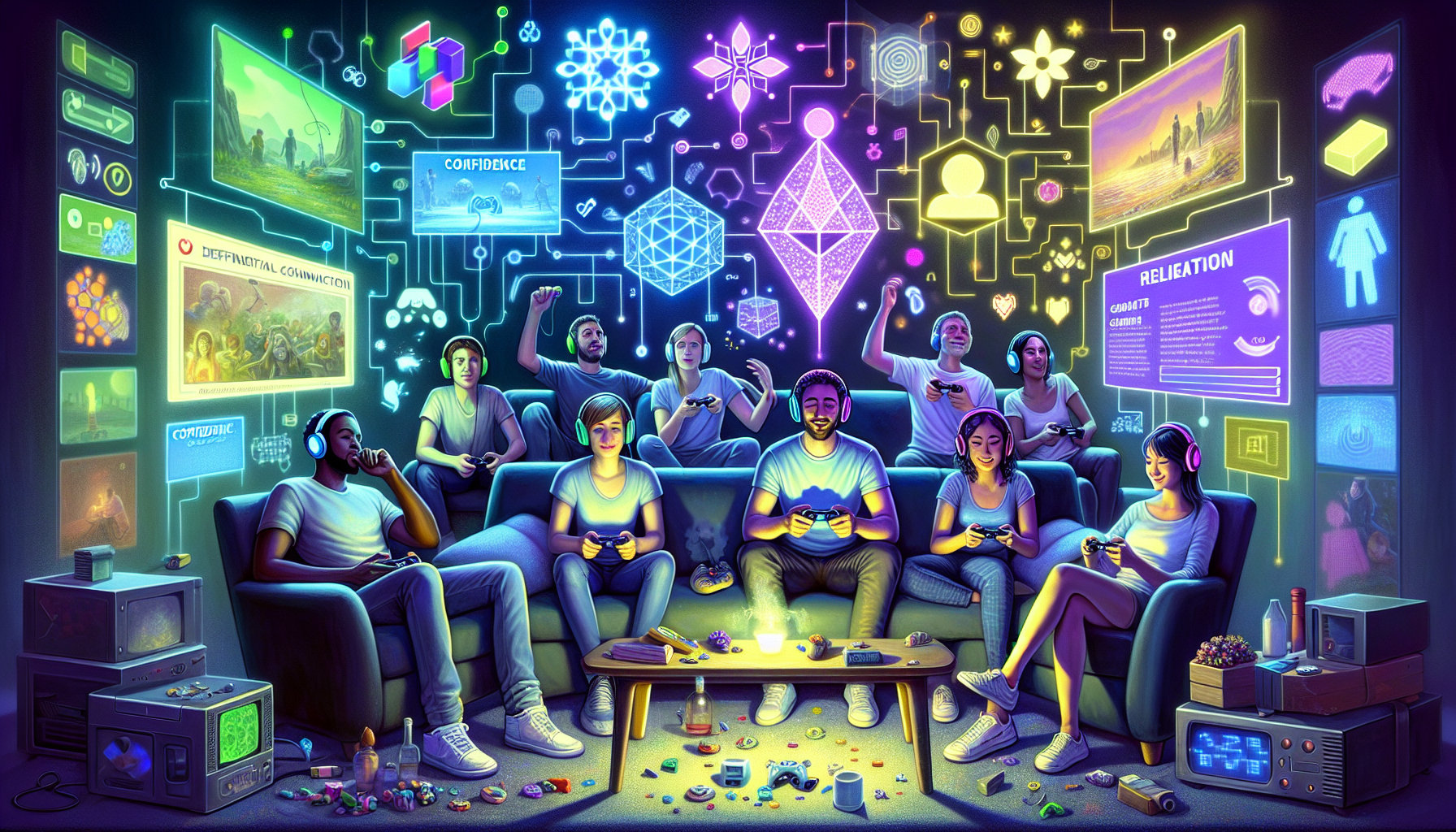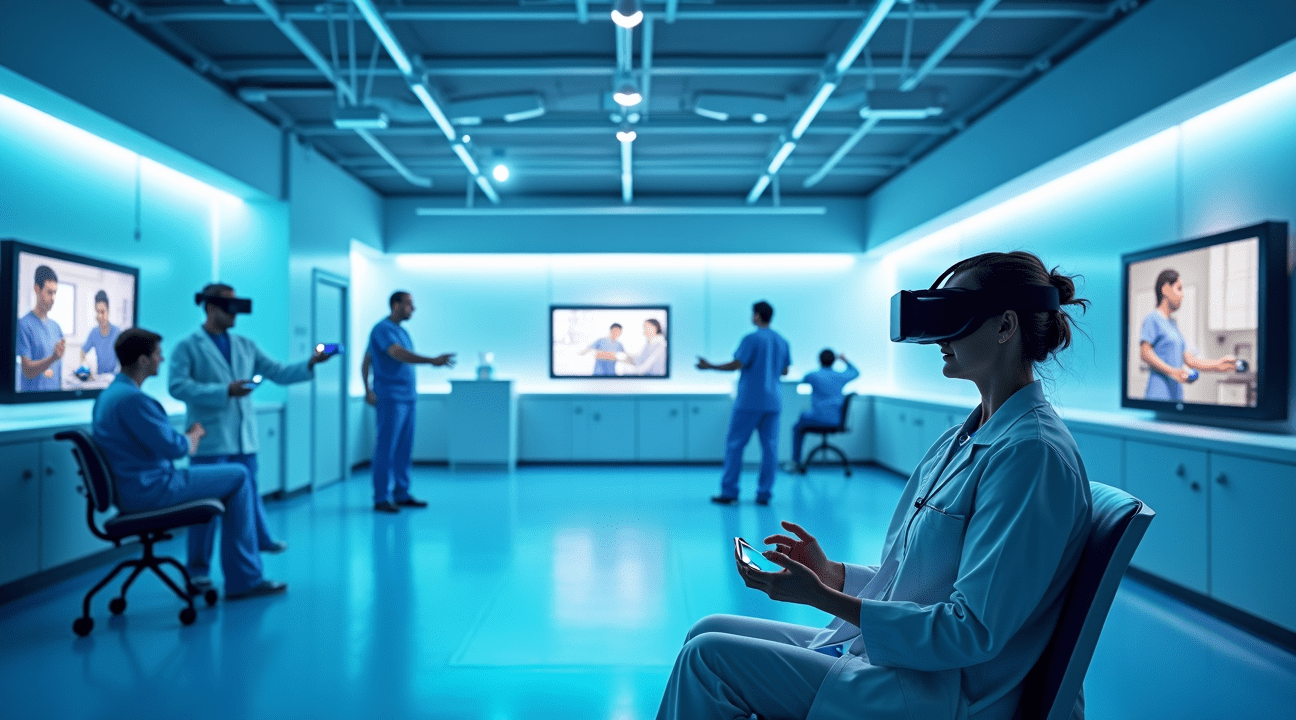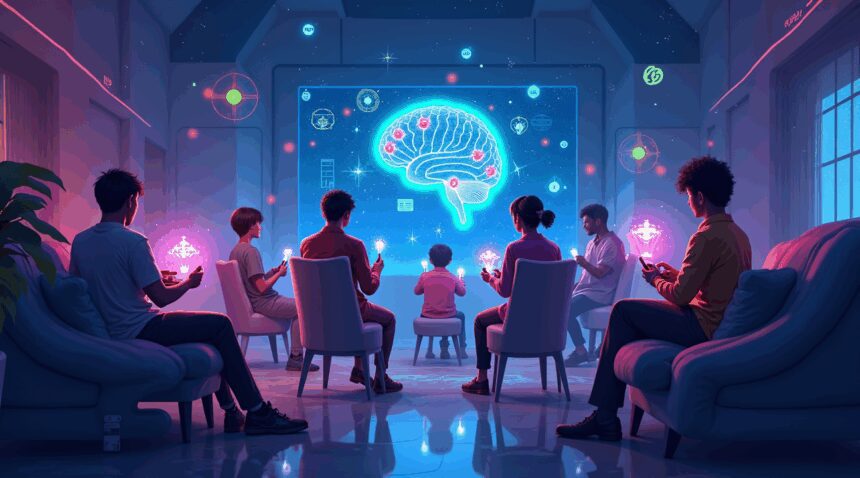Recent research reveals that video games deliver measurable cognitive benefits, with studies showing improved impulse control, working memory, and mental flexibility in regular players.
Gaming also serves as an effective stress management tool, with 71% of players globally reporting reduced stress levels and clinical studies demonstrating 69% improved psychological therapy outcomes when games are integrated into treatment.
Key Takeaways
- Gaming enhances multiple cognitive abilities including working memory, attention control, executive function, and reaction times, with benefits persisting even when not actively playing.
- Video games provide significant mental health benefits, helping 71% of players reduce stress and 68% manage anxiety while combating loneliness through online social connections.
- Multiplayer gaming develops essential social skills such as teamwork, leadership, communication, and conflict resolution that translate directly to real-world personal and professional situations.
- Gaming technology proves effective in medical applications, improving outcomes in 59% of physical therapy studies and enhancing clinical skills by 46% in medical training programs.
- Regular gaming increases gray matter in brain regions associated with memory, spatial navigation, and strategic planning, supporting long-term cognitive health and neuroplasticity.
For more insights into how gaming contributes to mental and cognitive health, visit this related article on the American Psychological Association’s site.
Gaming Boosts Brain Power: The Science Behind Cognitive Enhancement
The connection between video gaming and enhanced cognitive abilities has become increasingly clear through extensive research. Regular video game play delivers measurable improvements in multiple areas of brain function, including better scores on tests of impulse control, working memory, mental flexibility, attention, planning, and fluid intelligence.
A compelling study of nearly 2,000 children revealed striking differences between gamers and non-gamers. Children who played video games three or more hours daily performed significantly better on impulse control and working memory tasks compared to those who didn’t game at all. This research demonstrates that video games have positive impacts on developing minds in ways that extend far beyond entertainment.
Action Gaming and Executive Function
Action video game players consistently outperform non-gamers across multiple cognitive domains. Their enhanced capabilities include:
- Superior executive function skills that help with decision-making and problem-solving
- Advanced visuospatial skills for better spatial awareness and navigation
- Faster reaction times that translate to improved responsiveness in real-world situations
- Enhanced attention control that allows for better focus and concentration
These improvements aren’t just temporary boosts during gaming sessions. The cognitive benefits transfer to other activities and persist even when players aren’t actively gaming.
Video gaming creates lasting changes in brain structure itself. Research shows that gaming is associated with increased gray matter in the brain, which directly supports essential skills like muscle control, memory, and perception. This structural enhancement represents genuine neuroplasticity – the brain’s ability to reorganize and strengthen itself through experience.
Memory improvements from video game training prove particularly durable. Both short-term and episodic memory enhancements can persist several months after completing video game training programs. This persistence suggests that gaming creates fundamental changes in how the brain processes and stores information rather than just temporary skill boosts.
The cognitive training aspects of gaming work because many video games naturally incorporate elements that challenge multiple brain systems simultaneously. Players must track multiple objects, make rapid decisions, adapt to changing circumstances, and execute complex sequences of actions. This multi-tasking environment provides intensive cognitive workouts that strengthen neural pathways.
Different game genres target different cognitive skills:
- Strategy games enhance planning abilities and working memory
- Puzzle games improve problem-solving skills and mental flexibility
- Action games boost reaction times and attention control
This variety means that diverse gaming experiences can address multiple aspects of cognitive enhancement.
The research consistently shows that gaming tackles real-world problems by building cognitive skills that apply beyond virtual environments. Students who game regularly often demonstrate better academic performance in areas requiring quick thinking and information processing.
Brain imaging studies have revealed that gamers show increased activity in regions associated with attention and visuospatial skills. These changes appear across age groups, suggesting that cognitive benefits from gaming aren’t limited to young people. Adults can also experience meaningful cognitive enhancement through strategic gaming.
The impulse control improvements observed in young gamers are particularly noteworthy because this skill correlates with better academic performance, healthier relationships, and reduced risk-taking behaviors. Games that require players to wait for optimal timing or resist immediate gratification naturally train this crucial life skill.
Working memory enhancement through gaming has practical applications in educational settings. Students with stronger working memory can better follow complex instructions, solve multi-step problems, and maintain focus during challenging tasks. These skills directly support academic achievement across subjects.
The scientific evidence supporting gaming’s cognitive benefits continues to grow stronger. As researchers conduct more sophisticated studies with larger sample sizes and longer follow-up periods, the positive effects of strategic gaming on brain power become increasingly undeniable. This research foundation provides strong support for incorporating gaming into educational and therapeutic contexts where cognitive enhancement is desired.
How Gaming Relieves Stress and Improves Mental Health
I’ve observed a remarkable shift in how people view gaming’s impact on mental wellbeing. The evidence supporting gaming as a stress-relief tool continues to mount, with 71% of players globally confirming that video games help them feel less stressed. This percentage jumps to an impressive 78% among players in the United States, highlighting the significant role gaming plays in stress management across different populations.
The relationship between gaming and anxiety reduction presents equally compelling data. In the U.S., 68% of players report that gaming effectively helps reduce their anxiety levels. This isn’t simply about distraction—gaming provides active engagement that can redirect anxious thoughts and create a sense of accomplishment through goal completion and skill development.
Gaming’s Role in Combating Loneliness and Building Connections
Gaming addresses one of the most pressing mental health challenges of our time: loneliness. I find it particularly noteworthy that 53% of players say gaming helps alleviate their feelings of isolation by connecting them with others online. These connections often extend beyond casual gameplay, developing into meaningful relationships that provide emotional support and companionship.
The social aspect of modern gaming creates virtual communities where players can:
- Share experiences and challenges with like-minded individuals
- Collaborate on complex tasks that build teamwork skills
- Maintain connections across geographical boundaries
- Find acceptance and belonging within gaming communities
- Develop communication skills through voice chat and text interactions
Clinical research supports these anecdotal reports about gaming’s therapeutic potential. Video games improved 69% of psychological therapy outcomes in clinical studies, suggesting they offer genuine promise as supportive tools alongside traditional therapeutic approaches. This improvement rate demonstrates that gaming can amplify the effectiveness of conventional mental health treatments when properly integrated.
Gaming’s ability to improve mood stems from several psychological mechanisms. The interactive nature of games triggers dopamine release through achievement systems, while immersive experiences provide temporary escape from daily stressors. Many players describe gaming sessions as their preferred method of relaxation after demanding workdays or challenging life events.
The structured nature of many games also provides a sense of control and predictability that can be particularly beneficial for individuals dealing with anxiety or depression. Clear objectives, measurable progress, and immediate feedback create an environment where success feels attainable and effort is consistently rewarded.
Video games shape individuals in ways that extend far beyond entertainment value. The cognitive engagement required for gaming activates problem-solving skills while simultaneously providing emotional regulation through focused attention and flow states.
Different game genres offer varying mental health benefits:
- Puzzle games enhance cognitive function while providing meditative focus
- Action games can improve reaction times and decision-making under pressure
Research shows players prefer games over passive entertainment partly because of these active engagement benefits.
The timing and duration of gaming sessions also influence mental health outcomes. Short, focused gaming sessions often provide the most effective stress relief without leading to fatigue or negative consequences. Players who use gaming strategically—such as after stressful events or during breaks—tend to experience the most significant mental health benefits.
Gaming’s positive impact on psychological wellbeing challenges outdated stereotypes about video game effects. As games tackle real-world problems, they simultaneously address personal mental health challenges through engaging, interactive experiences that traditional stress-relief methods might not provide.
The accessibility of gaming as a mental health tool makes it particularly valuable. Unlike therapy or medication, gaming is readily available, cost-effective for many people, and can be accessed immediately when stress or anxiety levels spike. This immediate availability makes gaming an excellent first-line approach for managing daily mental health challenges while complementing professional treatment when needed.

Building Social Skills and Teamwork Through Multiplayer Gaming
Gaming has transformed from a solitary activity into a dynamic social experience that develops essential interpersonal skills. Video games are shaping individuals in ways that extend far beyond entertainment, particularly through multiplayer experiences that require collaboration and communication. Research consistently shows that children and adults who engage in gaming demonstrate stronger social abilities and form better relationships compared to their non-gaming peers.
The collaborative nature of multiplayer games creates natural environments for developing leadership qualities and communication skills. Players must coordinate strategies, delegate responsibilities, and adapt their approach based on team dynamics. These virtual experiences translate directly into real-world scenarios where teamwork proves essential. Whether managing a guild in an MMORPG or coordinating tactics in a first-person shooter, gamers learn to express ideas clearly, listen actively, and resolve conflicts constructively.
How Cooperative Gaming Builds Essential Life Skills
Multiplayer gaming environments demand specific social competencies that benefit players across various life situations:
- Clear communication becomes essential when coordinating complex strategies with team members from different backgrounds and time zones
- Leadership skills develop naturally as players take turns directing group activities and making critical decisions under pressure
- Conflict resolution improves through navigating disagreements about tactics, resource allocation, and role assignments
- Cultural awareness expands when collaborating with international players who bring diverse perspectives and approaches
- Patience and empathy grow through supporting less experienced players and helping them develop their abilities
Online gaming communities serve as remarkable platforms for forming lasting friendships that often extend beyond virtual boundaries. Players develop genuine connections through shared experiences, mutual support during challenging content, and regular communication through voice chat and messaging systems. These relationships frequently transition into real-world meetings, creating social networks that span geographic distances.
The academic benefits of multiplayer gaming align closely with social skill development. Students who participate in collaborative gaming show improved performance in group projects, better classroom participation, and enhanced problem-solving abilities. Gaming teaches players to view challenges from multiple angles, consider team members’ strengths and weaknesses, and adapt strategies based on collective feedback.
Virtual communities formed around specific games create inclusive spaces where individuals can express themselves authentically while contributing to group success. Gaming tackles real-world problems by providing safe environments for practicing social interactions, especially valuable for individuals who struggle with face-to-face communication or social anxiety.
The structure of cooperative games naturally teaches players about accountability and reliability. Team success depends on each member fulfilling their role consistently, creating strong motivation for personal responsibility. Players learn that their actions directly impact others’ experiences, fostering consideration and commitment that carries over into professional and personal relationships.
Gaming communities also demonstrate remarkable resilience and support systems. Players rally around members facing difficulties, organize charity events, and maintain connections during life transitions. These communities offer emotional support networks that rival traditional social groups in their depth and consistency.
The time-sensitive nature of many multiplayer games develops quick decision-making skills and teaches players to trust their instincts while remaining open to team input. Players learn to balance individual initiative with group consensus, a skill particularly valuable in modern workplace environments that emphasize collaborative problem-solving.
Cross-generational gaming experiences bridge age gaps as younger and older players collaborate on equal footing. These interactions break down stereotypes and create mutual respect based on skill and contribution rather than age or background. Family gaming sessions strengthen bonds between parents and children while teaching valuable lessons about cooperation and friendly competition.
The global reach of online gaming exposes players to different cultures, languages, and worldviews in ways that traditional social activities cannot match. This exposure builds tolerance, curiosity, and adaptability that serve players well in increasingly interconnected personal and professional environments. Gaming communities celebrate diversity while maintaining focus on shared goals and mutual achievement.

Gaming as a Tool for Physical Therapy and Medical Training
Video games have emerged as powerful therapeutic tools that extend far beyond entertainment, revolutionizing rehabilitation and medical education practices. Research demonstrates that gaming applications contribute to improved outcomes in 59% of physical therapy studies and 50% of physical activity interventions, establishing their effectiveness as valuable adjuncts in rehabilitation settings. This evidence challenges traditional perceptions about gaming while highlighting its potential to transform healthcare delivery.
Rehabilitation and Physical Recovery
Physical therapists increasingly incorporate gaming technology to enhance patient engagement and accelerate recovery outcomes. The interactive nature of video games motivates patients to complete exercises they might otherwise find repetitive or challenging. Motion-controlled gaming systems enable precise tracking of patient movements while providing real-time feedback, creating an environment where therapy feels less like work and more like play.
Gaming applications address specific rehabilitation needs through customizable difficulty levels and adaptive challenges. Patients recovering from strokes benefit from games that encourage arm movement and coordination, while those with balance disorders find stability training through virtual reality experiences. The gamification of physical therapy exercises leads to improved adherence rates, as patients become more invested in achieving digital milestones and competing with previous performance scores. Video games shape individuals in measurable ways that extend to physical recovery and skill development.
Occupational therapy programs utilize gaming to rebuild fine motor skills and cognitive function simultaneously. Specialized software helps patients relearn daily tasks through virtual simulations that mirror real-world activities. These applications prove particularly effective for individuals recovering from traumatic brain injuries or those managing developmental disabilities.
Medical Training and Professional Development
Medical simulation games demonstrate remarkable effectiveness in developing practical clinical skills, with studies showing a 46% improvement in clinician skills outcomes. These training platforms create risk-free environments where healthcare professionals practice complex procedures without patient safety concerns. Surgical simulators allow doctors to rehearse operations repeatedly, building muscle memory and confidence before entering actual operating rooms.
Emergency response training benefits significantly from gaming technology, as medical personnel can experience high-stress scenarios without real-world consequences. First responders use virtual reality systems to practice trauma protocols, disaster response procedures, and patient triage decisions. The immersive nature of these simulations provides realistic stress responses that mirror actual emergency situations.
Nursing education incorporates gaming to teach patient communication skills, medication administration protocols, and critical thinking processes. Students navigate virtual hospital environments where they encounter diverse patient scenarios and learn to make split-second decisions that affect outcomes. These experiences bridge the gap between theoretical knowledge and practical application, preparing healthcare workers for the unpredictable nature of clinical practice.
Gaming tackles real problems by providing safe spaces for professional development and skill refinement across medical disciplines.
Research indicates that regular gaming contributes to increased gray matter in brain regions associated with spatial navigation, memory formation, and strategic planning. This neuroplasticity benefit proves particularly valuable for older adults, as enhanced gray matter density may help delay cognitive decline and preserve mental acuity. Gaming sessions stimulate multiple brain regions simultaneously, creating neural connections that support long-term cognitive health.
The precision required in many video games develops hand-eye coordination and reaction times that translate directly to medical procedures. Surgeons who engage in gaming often demonstrate superior laparoscopic skills and faster adaptation to robotic surgical systems. These cognitive benefits extend beyond immediate skill acquisition, contributing to sustained professional competence throughout healthcare careers.
Gaming technology continues evolving to address specific medical needs, with developers collaborating directly with healthcare professionals to create targeted therapeutic applications. This partnership ensures that gaming solutions remain grounded in evidence-based practices while maintaining the engaging elements that drive patient participation and professional skill development.

Sources:
nih.gov
Frontiers in Psychology
Entertainment Software Association
JAMA Network Open
American Journal of Preventive Medicine
Western University
GEICO Living
APA Open


